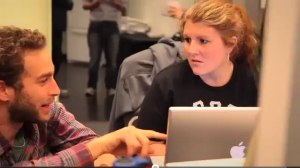But the move to create a series of Startup Weekends focused solely on education comes with its own set of challenges. Chief among these: how do you make sure to include educators? After all, if the goal is to help launch new education startups or to foster education innovation, how can those who are integral to the process -- those with the most extensive "domain expertise," those who know both the problems and what the potential solutions might look like -- feel welcome?
Watching Startup Weekend EDU develop over the course of the last few events, it's clear that the organizers are working hard to make sure that educators are not just present (reaching out to various teacher list-serves, for example, to encourage participation) but that their voice there is really recognized. After the pitches on Friday nights, for example, the educators present received special "teacher approved" stickers during the voting process, and they were asked to say why they thought some ideas were particularly important, needed, or doable.
But there is still lots of work to be done to make this event really "work." How do you bridge the cultural divides -- perceived and real -- between entrepreneurs and educators, between hackers and high school teachers? How do you convince educators, already overworked, to spend 54 hours over the course of a weekend working on building an education technology startup?
In some ways, the emphasis on "building a startup" might be the wrong thing to tout. There are viable ideas that come out of the weekend. (LessonCast, for example, a startup that was founded back at the first Startup Weekend EDU in San Francisco in June and that I covered back in July, is still going strong.) But the most valuable outcome of Startup Weekends aren't just the products built or the startups launched. It's the process itself.
And it is an intensive learning process. For many who participate, it's their first hands-on experience in product pitching, product design, customer validation, and business model creation. It's a hands-on learning experience in what it means to build a tech product and potentially a tech company. That might sound appealing to the entrepreneurs and engineers who participate, but for the classroom teacher (particularly one with no intention to leave the field to start a business), not so much.
But if you ask teachers, there actually is a reward. "It was the most incredible and immersive learning experience I have ever have," said Sharon Grimes, from Baltimore County Schools.
Despite all the talk about implementing "project-based learning" in the classroom, much of educators' own professional development still looks a lot like the sorts of teaching practices and experiences that are beginning to be eschewed in the classroom: lectures, the "sage on the stage," no participation, little to no interactivity, no opportunity to identify a problem let alone work towards designing or implementing a solution. Participating in Startup Weekend, on the other hand, provides a project-based learning opportunity, one where teams must be coordinated through research, development, and marketing -- something that educators may be incredibly well-suited to do here.
Some of the startups that were pitched last night at the end of the DC Startup Weekend EDU were clearly teacher-driven projects: a tool to translate student data into easy-to-read and actionable infographics for parents, an openly licensed bank of assessments created for teachers by teachers, an app to make the notion of "our global world" more engaging for students based on their own interests, a browser-based plug-in for language-learning.
Again, it's the experience itself, not just the products that were built over the course of the last 54 hours -- that's what Startup Weekend EDU seems to be working towards. It isn't simply launching startups; it's building a network of educators, engineers, and entrepreneurs who've worked together and who are beginning to think through problem-solving and hands-on building in order to address needs in education.
Check out this quick overview video to get a sense of what these startup weekends are about.


